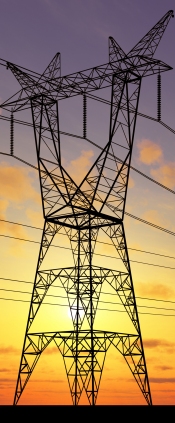- Overview
- Privatisation
- Rural electrification
- Renewable energies
- high fixed costs of setting up extensive physical infrastructure
- government regulation of prices
- opposition from consumers and trade unions
- heavily indebted state-owned electricity sectors
- low growth prospects
- the long time it takes for a new privately invested company to break even in terms of profit.
- Hydropower, like in the rest of the world, is of course the most utilised renewable energy resource in the association of countries. Canada is in fact the world’s biggest producer of hydropower.
- The use of solar panels is seen as feasible in particularly many African and Asian developing countries, which are geographically located for optimal absorption of the sun’s rays.
- With continual advances in wind generation technology a number of countries have developed extensive wind farms. Thanet Wind Farm in the UK is now, since 2010, the biggest off-shore wind farm in the world.
- Under the Kyoto Protocol’s Clean Development Mechanism (CDM), a UNFCCC† initiative set up to combat global warming, climate change emission-reduction projects in developing countries can earn emission-reduction credits, which generate hard currency revenue from developed countries. India is the Commonwealth country that has been most successful at garnering CDM credits through many of its renewable energy projects.
- Other renewable energy initiatives can commonly be seen in Malaysia (biomass), Kenya (geothermal) and Canada (biofuels).
Overview: Electricity and power in the Commonwealth

Electricity is an essential service for economic growth and poverty alleviation in the Commonwealth and beyond. From an economic perspective electricity provides countries a means and a backdrop to support and drive production processes in all manner of industries. From a social perspective it is not a coincidence that in the less developed countries, where access to electricity remains low, social services such as health and education remain inadequate.
Fossil fuels (coal, oil and gas) are a major source of electric power in the Commonwealth, contributing on average 70% for each country’s electric energy requirements; followed by hydropower (27%), nuclear (1%) and other energy resources (1%). Several Commonwealth countries are highly dependent on one energy source for their electricity supply: Malta (oil contributes 100%), Trinidad (gas, 99.6%), Brunei (gas, 99%), Mozambique (hydropower 99.9%), Zambia (hydropower 99.4%), Botswana (coal 99.5%) and South Africa (coal, 94.7%). Relatively speaking the country with the most diversified sources of electric energy in the Commonwealth is Canada; the country effectively utilises fossil fuels, hydropower and nuclear energy resources. Electricity prices in Canada are some of the lowest in the world but Canadians are also the highest per capita consumers of electricity in the Commonwealth and among the highest in the world.
Privatisation of electricity in the Commonwealth

Most of the Commonwealth embarked on a pathway to electricity sector deregulation and privatisation in the 1990s. Key influences behind this phenomenon include what Zhang et al (2008) call push and pull factors*. Push factors include poor performance of state-run electricity operators, the need for investment and funding for maintenance costs and a desire to curb subsidies. Pull factors include advocacy of reform by international financial institutions, pioneering reforms in other countries such as the UK and rapid changes in technology which make privatisation viable. Currently, nine Commonwealth countries have privatised the electricity sector and 11 are partially privatised (2011). Although various forms of private contracting may take place the government still retains full ownership of the main electricity operator or operators in 34 countries. Major impediments to full privatisation in instances where deregulation has succeeded, from the perspective of investors, include:
*Zhang, Yingang & Parker, David & Kirkpatrick, Colin, 2004. “Competition, Regulation and Privatisation of Electricity Generation in Developing Countries: Does the Sequencing of the Reforms Matter?,” Centre on Regulation and Competition (CRC) Working papers 30599, University of Manchester, Institute for Development Policy and Management (IDPM).
Rural electrification in developing parts of the Commonwealth

Rural electrification has sizeable benefits for many countries, promoting economic growth and enhancing health and education. Expansion of the electricity grid to rural areas is seen as one of the main developmental challenges that Commonwealth developing member states in Africa and South Asia face. Most countries in these two regions have embarked on one electricity grid expansion initiative or another, but lack of investment and enterprise remain major stumbling blocks.
Renewable energies in the Commonwealth

As a result of global warming, the finiteness of fossil fuels and the need to expand electricity access to poor areas, renewable energies have been promoted considerably in several Commonwealth countries.
† United Nations Framework Convention on Climate Change


